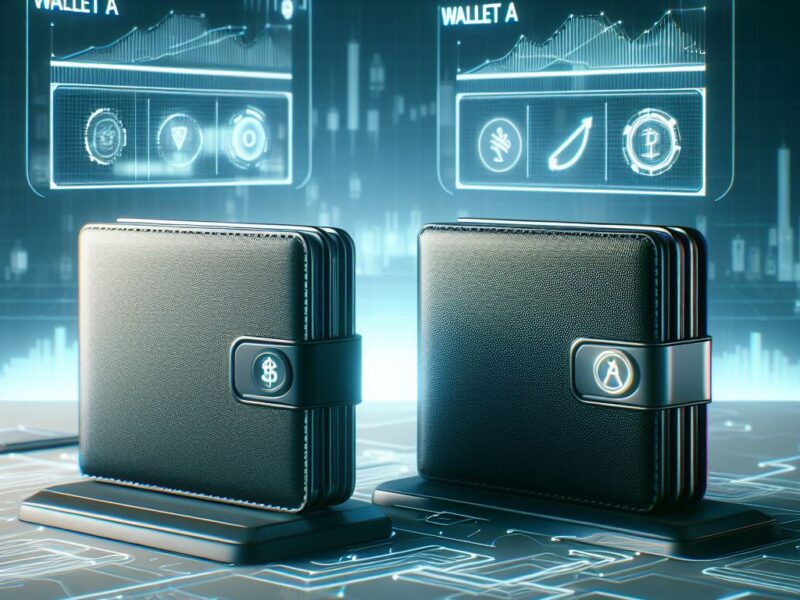Are you new to cryptocurrencies and feeling a bit devastated by all the wallet options out there? Don’t worry, you’re not alone! One of the most important decisions you’ll need to make is whether to use a hot wallet or a cold wallet to store your digital assets. Here are options on choosing the right crypto wallet today.
What are Cryptocurrency Wallets?
A cryptocurrency wallet is a software program or physical device that allows you to store, send, and receive digital currencies like Bitcoin, Ethereum, and Litecoin. Your wallet contains a set of private and public keys that enable you to access your funds and execute transactions on the blockchain network.
Related: Blockchain Technology in the Automotive Industry and Supply Chain Management
Hot Wallets
Hot wallets are cryptocurrency wallets that are connected to the internet. They can be accessed through mobile apps, desktop software, or web-based platforms. Some popular examples of hot wallets include:
- Coinbase Wallet
- Mycelium
- Exodus
Advantages of Hot Wallets
- Easy to set up and use
- Accessible from anywhere with an internet connection
- Ideal for frequent transactions and trading
- Many offer built-in exchange features
Disadvantages of Hot Wallets
- More vulnerable to hacking and cyber attacks
- Reliant on the security of the platform or device
- Not suitable for long-term storage of large amounts of cryptocurrency
Cold Wallets
Cold wallets, also known as hardware wallets, are physical devices that store your cryptocurrency offline. They are not connected to the internet, making them much more secure against hacking attempts. Some popular cold wallet options include:
- Ledger Nano S
- Trezor Model T
- KeepKey
Advantages of Cold Wallets
- Highest level of security for your digital assets
- Immune to online threats like malware and phishing scams
- Ideal for long-term storage of large amounts of cryptocurrency
- Private keys never leave the device
Disadvantages of Cold Wallets
- Requires an initial investment to purchase the hardware
- Less convenient for frequent transactions
- Can be lost or damaged if not stored properly
- Setup process may be intimidating for beginners
Choosing Between Hot and Cold Wallets
So, which type of wallet should you choose? The answer depends on your need, and risk tolerance. Here are some factors to consider:
When to Use a Hot Wallet
- If you’re new to cryptocurrencies and want an easy way to get started
- If you plan to make frequent transactions or engage in trading
- If you only intend to store small amounts of cryptocurrency
- If you prioritize convenience and accessibility over maximum security
When to Use a Cold Wallet
- If you plan to hold large amounts of cryptocurrency for the long term
- If security is your top priority and you want to minimize the risk of hacking
- If you’re comfortable with a slightly more complex setup process
- If you don’t mind the added inconvenience of offline storage
Best Practices for Cryptocurrency Wallet Security
Regardless of whether you choose a hot or cold wallet, there are some best practices you should follow to keep your digital assets safe:
- Use strong, unique passwords and enable two-factor authentication when available.
- Never share your private keys or recovery phrases with anyone.
- Regularly update your wallet software to ensure you have the latest security features.
- Consider using multiple wallets to spread out your risk.
- Always double-check the recipient’s address before sending a transaction.
Key Takeaways
1. Cryptocurrency wallets are essential tools for storing, sending, and receiving digital currencies.
2. Hot wallets are connected to the internet and offer convenience, while cold wallets are offline and provide the highest level of security.
3. Hot wallets are suitable for beginners, frequent transactions, and storing small amounts of cryptocurrency.
4. Cold wallets are ideal for long-term storage of large amounts of cryptocurrency and for those who prioritize security over convenience.
5. Regardless of the type of wallet chosen, users should follow best practices such as using strong passwords, enabling two-factor authentication, and regularly updating their wallet software.
6. When selecting a cryptocurrency wallet, consider your individual needs, as this will enable you in making an informed decision.
Frequently Asked Questions
1. What is the main difference between a hot wallet and a cold wallet?
The primary difference between a hot wallet and a cold wallet is their connection to the internet. Hot wallets are connected to the internet, making them more convenient but also more vulnerable to hacking attempts. Cold wallets, on the other hand, are offline devices that provide the highest level of security but may be less convenient for frequent transactions.
2. Can I store multiple cryptocurrencies in a single wallet?
Many cryptocurrency wallets support multiple digital currencies, allowing you to store and manage various assets in a single place. However, it’s essential to check the specific wallet’s compatibility with the cryptocurrencies you intend to store.
3. What should I do if I lose my cold wallet device?
If you lose your cold wallet device, you can recover your funds using the recovery phrase (also known as a seed phrase) provided during the initial setup. Make sure to keep this recovery phrase safe and secure, as it grants access to your wallet. You can use the recovery phrase to restore your wallet on a new device.
4. Are hot wallets completely unsafe to use?
While hot wallets are more vulnerable to online threats compared to cold wallets, they are not completely unsafe. Many reputable hot wallet providers implement strong security measures to protect users’ funds. However, it’s crucial to choose a trusted wallet provider and follow best practices to minimize risks.
5. Do I need technical expertise to set up a cold wallet?
Setting up a cold wallet may require more technical knowledge compared to hot wallets, as it involves managing a physical device and understanding the basics of private key storage. However, most reputable cold wallet manufacturers provide detailed instructions and support to guide users through the setup process.
6. How do transaction fees differ between hot and cold wallets?
Transaction fees are determined by the cryptocurrency network and not by the type of wallet you use. Whether you use a hot or cold wallet, the transaction fees will be the same for a given cryptocurrency.










